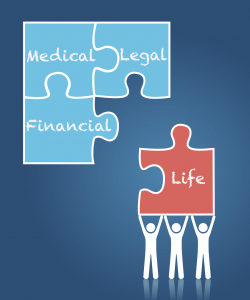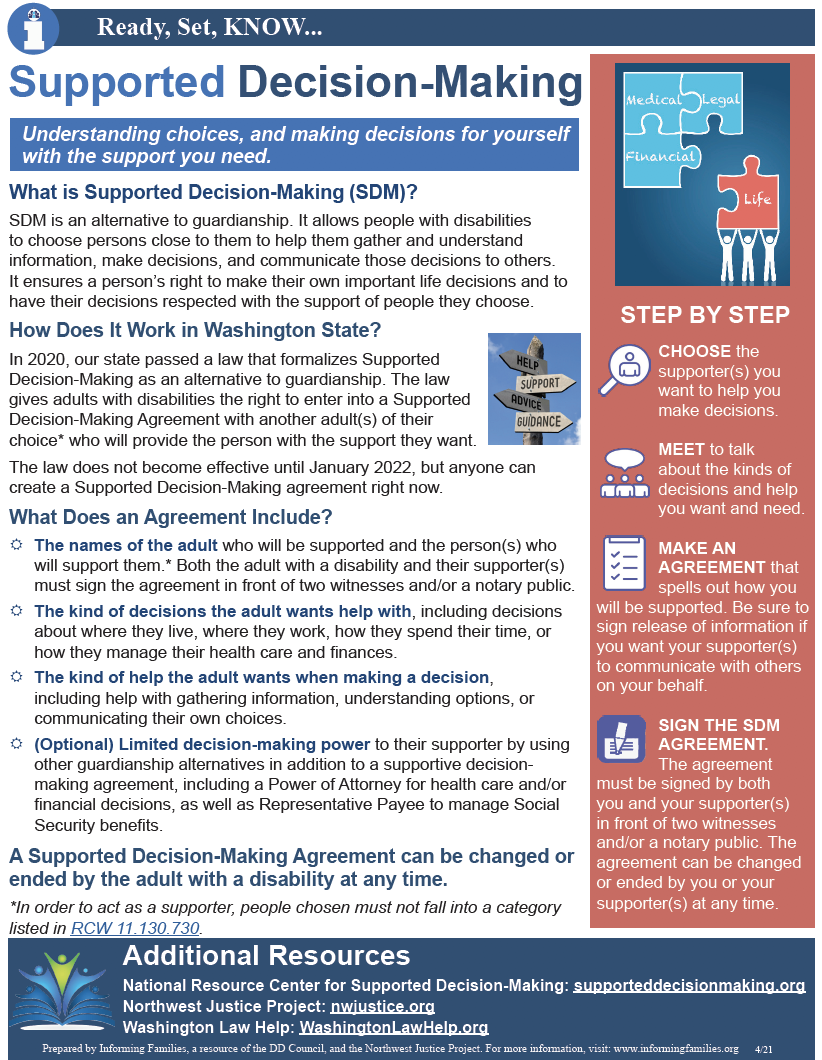Understanding choices, and making decisions for yourself with the support you need.
Español (Spanish) | русский (Russian) | Soomaali (Somali) | Tiếng Việt (Vietnamese)
What is Supported Decision-Making?
Supported Decision-Making (SDM) is an alternative to guardianship. It allows people with disabilities to choose persons close to them to help them gather and understand information, make decisions, and communicate those decisions to others. It ensures a person’s right to make their own important life decisions and to have their decisions respected with the support of people they choose.
How Does It Work in Washington State?
In 2020, our state passed a law that formalizes Supported Decision-Making as an alternative to guardianship. The law gives adults with disabilities the right to enter into a Supported Decision-Making Agreement with another adult(s) of their choice* who will provide the person with the support they want.
The law does not become effective until January 2022, but anyone can create a Supported Decision-Making agreement right now.
What Does an Agreement Include?
- The names of the adult who will be supported and the person(s) who will support them.* Both the adult with a disability and their supporter(s) must sign the agreement in front of two witnesses and/or a notary public.
- The kind of decisions the adult wants help with, including decisions about where they live, where they work, how they spend their time, or how they manage their health care and finances.
- The kind of help the adult wants when making a decision, including help with gathering information, understanding options, or communicating their own choices.
- (Optional) Limited decision-making power to their supporter by using other guardianship alternatives in addition to a supportive decision-making agreement, including a Power of Attorney for health care and/or financial decisions, as well as Representative Payee to manage Social Security benefits.
*In order to act as a supporter, people chosen must not fall into a category listed in RCW 11.130.730.
A Supported Decision-Making Agreement can be changed or ended by the adult with a disability at any time.
Step by Step
- Choose the supporter(s) you want to help you make decisions.
- Meet to talk about the kinds of decisions and help you want and need.
- Make an Agreement that spells out how you
will be supported. Be sure to sign release of information if you want your supporter(s) to communicate with others on your behalf. - Sign the SDM Agreement. The agreement must be signed by both you and your supporter(s) in front of two witnesses and/or a notary public. The agreement can be changed or ended by you or your supporter(s) at any time.
“The decision process is part of being whole… If I try to force Ryan to do something, I am destroying his selfness and being whole. He is a whole person and he is making decisions and I encourage him.” –Herbert King supporteddecisionmaking.org
Learn More
National Resource Center for Supported Decision-Making
Northwest Justice Project
Washington Law Help
Missouri Family to Family: Partnering Together in Supported Decision Making
Stories of Supported Decision-Making
Conversations with Ivanova on Supported Decision Making (video)
Printable Version English | Español (Spanish) | русский (Russian) | Soomaali (Somali) | Tiếng Việt (Vietnamese)







